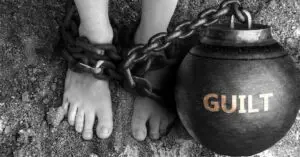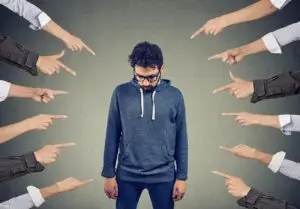Guilt Stinks
What am I to do about the Guilt I feel?

Guilt stinks. Sometimes, like right now, I feel guilty? Why? I’ve had a great life. Lots of opportunities. Lots of different interesting jobs. The ability to move around the country. The luxury of choice. Enough extra cash to afford a nice house, a cottage, and to pay for my kids University education. Life is good. But after reading, for many years, that my high standard of living has come at a cost – a very high cost – the cost of an environment at least partially destroyed for my grandchildren, what I mostly feel is guilt; and it stinks. Yes, guilt stinks. Really, it does. It robs you of joy and appreciation and a sense of empowerment and purpose. Nothing matters anymore – because I messed up. I am guilty. However, I find nothing terribly helpful about this emotion. It seems mostly destructive to me, and yet here I am, feeling guilty. I repeat – it REALLY stinks. So what are you and I to do as we feel guilty. First, we must forgive ourselves as this allows this to move forward without the ball and chain of built which can stop of us from changing and acting. Second, how about this counter intuitive response – get ANGRY, REALLY ANGRY instead – and then do something. Not a half baked sort action, something with pizaz, something completely out of character, something completely not “normal”.
What does it feel like to know that we are killing God?
Part of a poem by Jenna Matlin
Is there support for this kind of response? Yes, at least according to Michaela Barnett, who is an editor at the Behavioral Scientist and a Ph.D. fellow in the Convergent Behavioral Science Initiative at the University of Virginia. Her research focuses on the perceptions and politics. Guilt, like sadness, is an understandable reaction that may be OK for a short moment – IF it helps you move on, to get angry, and then do something positive. Getting stuck in guilt, like getting stuck into sadness that becomes depression, is highly counterproductive. In fact, she says the people benefiting from the ecological destruction use it as a weapon to blame us for what they are doing! For example, do you ever feel like this?
“These days just buying a tomato at a grocery store means that you are unwittingly supporting toxic pesticides, exploiting labor, contributing to global warming. Humans think they are making one choice, but they are actually making dozens of choices!” Every day for the last decade, I have been trying to assuage my deep guilt about how I am destroying the planet with every purchase, each bite, every flight, every forgotten tote bag, and each straw a waiter has placed on my table before I can refuse. After years of feeling guilty and trying to contort myself into impossible shapes to satisfy my ethics in an impossibly complicated system, I’ve realized that it’s not my fault. Our sustainability guilt is misplaced. In the United States, our national infrastructure reflects the interest of corporate greed over people and the environment. While there is disagreement as to why federal legislation funded highway infrastructure over mass transit systems after WWII, more recently oil billionaires have been pouring money into efforts to kill public transit systems around the country. The majority of organic brands are owned by massive conglomerates: companies like Seventh Generation, Tom’s of Maine, and Burt’s Bees are owned by Unilever, Colgate-Palmolive, and The Clorox Company, respectively. This illusion of choice means that when we do our best to support a sustainable option, we are paying some of the biggest plastic polluters in the world. Under the guise of a free market, these monolithic companies influence regulation that leads to a system designed for their profits with little regard for the environment and all of us who inhabit it. I am still going to do my best to tread lightly on this planet and align my actions with my ethics. But I am also going to stop feeling guilty, and instead turn my guilt into anger at the powerful corporations who have designed a system that fails us and the earth.” [1]
While the above rant is valid and applies to Canada I see even this “blaming the government and corporations” as not going near far enough. We are a creature consuming resources that is in most ways no different than any other animal. If there are too many rabbits, everything is eaten and starvation quickly follows. If there is too much algae in a lake, the oxygen is depleted and most life in the lake dies. We are simply a species out of control reproducing and consuming without limit. So, the issue is limits. At the CACORwe all know. After all, our mantra is the punchline from the book “Limits to Growth” – but our society’s foundation and our high quality of life is built upon exponential growth. Furthermore, our culture has encouraged a focus on our animal needs through advertising that creates needs that do not actually exist. The most famous recent example of this is Apple’s Smart Phone, which, according to a recent paper, began the exponential rise in “social perfectionism” by showing us limitless images of the perfect person, house, etc. and thus making us feel insecure and inferior and needing to buy something, anything, to fill that hole of emptiness and low self worth.
So, it’s our entire culture. It’s been a grand experiment in social engineering [Jarrod Diamond’s way of looking at society] – but now has proven to be a failure. That’s OK. That’s how we learn. So, now that we see that what do we do? Here are some ideas. First, don’t feel guilty – act. Change. Learn. Look around you and see the big picture. Connect with like minded people. Yes, consume less. Yes, “live simply so others may simply live”. Yes, vote for alternatives to BAU. But also realize that this alone will do nothing.
Get Angry & Act to help build a New Culture
Guilt can just be a way to control you to stop you from acting. What will happen if we don’t channel our guilt into an anger that moves us to change and to act? I think the recent disaster in Libya gives us a clue. Those in the know in Library KNEW that this catastrophic risk existed – but their warning were not heeded. In a similar way Scientists and Indigenous peoples and Poets have been telling us for decades that we are destroying the foundation of our lives as we destroy the natural world and as we continue to isolate ourselves from both each other and the consequences of our actions through a greater and greater reliance upon technology and the virtual world we now inhabit. So, take a read of what happened in poor Libya.
“Meanwhile officials told CNN the flood disaster that wiped out Derna neighbourhoods had happened within a span of just 90 minutes when the dams burst. The wall of water obliterated apartments while families were asleep on Sunday night (local time) and washed people, cars and buildings to sea. The World Meteorological Organisation said the huge loss of life could have been avoided if Libya — a failed state for more than a decade — had a functioning weather agency in place. “If there would have been a normally operating meteorological service, they could have issued warnings,” WMO Secretary-General Petteri Taalashe said in Geneva. “The emergency management authorities would have been able to carry out evacuations … And we could have avoided most of the human casualties.” Other commentators drew attention to warnings given in advance, including an academic paper published last year by a hydrologist outlining the city’s vulnerability to floods and the urgent need to maintain the dams that protected it. The death toll reached 11,000 on Saturday (AEDT), but many more bodies remain buried on the wasted landscape.” [2]
What can you do? One, and only one, part of the solution is to work your right brain more. That means, see the big picture. Include the search for new ways of thinking, feeling and other ways to live and other values that have the potential to be less impactful on the natural world. Connect with like minded people. Follow advice, and read, the book Braiding Sweetgrass by R.W. Kimmerer:
Know the ways of those human and non-human entities that care for you so that you can in turn care for them
Give thanks every time you receive and find a way to reciprocate
Sustain the ones who sustain you and the Earth will last forever.
And read poems, like this one:
No Simple Acts
Know today all you cannot repair.
So that you are free to do all that you can.
Let a hundred things be undone,
For you to do what matters most.
-Laura Martin

References
Leave a Reply